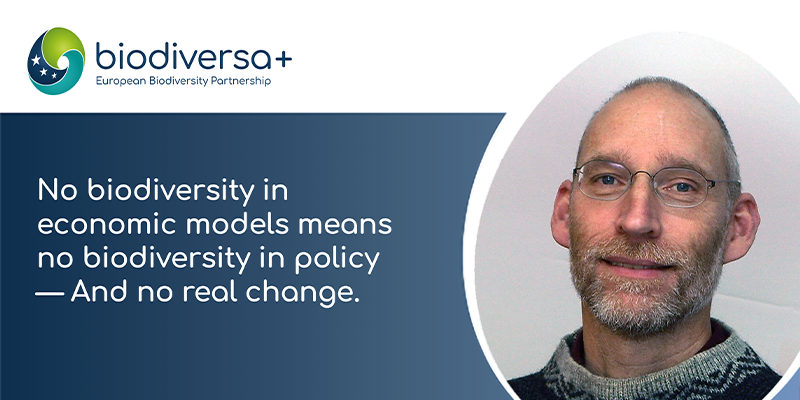On 3 June 2025, Biodiversa+ took part in the EU Cluster workshop on Transformative Change for Biodiversity in Brussels, co-organised by the European Commission and the BioAgora project. The event brought together EU-funded projects, researchers, and policy actors to take stock of research progress, identify persistent knowledge gaps, and explore how current insights can inform future EU policy and funding priorities.
Highlights:
- Key gaps remain: success indicators, risk and resilience, and integrating biodiversity into economics.
- Longer-term research is crucial to enable lasting, meaningful impact.
- A structured knowledge hub could turn transformative change from concept to action.
Bridging gaps and supporting long-term impact
Henrik Lange, who co-leads the Biodiversa+ work package on connecting research and innovation to policy, represented the Partnership at the event. In his intervention, he highlighted the knowledge gaps identified by Biodiversa+ in the lead-up to the BiodivTransform call. Among the most critical gaps: the need for robust success indicators, coherent assessment frameworks, and scalable socio-ecological solutions. He also pointed to underexplored areas such as risk, resilience, and preparedness, as well as the ongoing challenges in engaging businesses, integrating biodiversity into economic decision-making, and enabling a truly restorative economy.
A key message Lange brought to the discussion was the importance of long-term research support. “For some types of research, especially around transformative change, three years just isn’t enough,” he said. “You spend so long getting started that by the time you do, it’s already time to wrap up.” He advocates for longer-term schemes, even if that means fewer new initiatives, so researchers have the time and space to produce meaningful, lasting impact.
A strategic role in a crowded landscape
Lange also reflected on the distinctive role of Biodiversa+ in the EU research and policy landscape. “We’re not just another project,” he explained. “As a funder and broker between science and policy, we occupy a unique niche. We’re not only generating knowledge: we’re structured to ensure it’s usable and used.” This, he said, places a responsibility on the Partnership to remain strategic in a crowded and fast-evolving field. “The message from the consultations was clear: build on what you have. Don’t create new entities for the sake of it.” Lange sees a significant risk of fragmentation and inefficiency arising from the growing number of overlapping initiatives across Europe.
That said, he argued that one new structure could bring real value: a dedicated knowledge hub on transformative change. While still under discussion within Biodiversa+, the idea is being explored as a possible way to support this complex, cross-sectoral and still largely conceptual topic. “If anything merits a structured, mandate-driven hub, it’s this,” he noted. He contrasted such a hub with the informal, loosely defined “Knowledge Exchange Networks” (KENs) currently promoted under BioAgora. “A hub has a work plan, a defined lifespan, and a clear mandate. It’s proactive, not just a space for discussion, but a tool to consolidate and translate knowledge.” At the same time, he acknowledged that the timing of such a structure would need careful consideration, particularly in light of the BiodivTransform call, which will unfold over the next three years.
Where change really needs to happen
As the concept of transformative change gains traction in EU policy and research circles, Lange stressed that it must lead to tangible results. Much of the day’s discussions focused on the societal dimensions of transformative change. “Traditional natural sciences remain vital,” he said, “but that’s not where the change needs to happen. Economy, governance, power structures: that’s where transformation is truly required.” One particularly pressing theme emerging from the discussions was the role of economics in shaping biodiversity outcomes. As Lange put it, “There’s a major disconnect: biodiversity is still absent from most economic models. If economists don’t include it, it doesn’t appear in policy advice. And as long as that’s the case, transformative change will remain out of reach.”
Through its joint call on biodiversity and transformative change, ongoing synthesis work, and strategic foresight, Biodiversa+ is helping to fill these gaps and ensure that momentum translates into action. As Lange concluded, “Transformative change depends not only on knowledge: but on how we organise, connect, and apply it.”
For more insight into the mentioned knowledge gaps, you can refer to:
- Report on the first dialogue on transformative change
- Report on the second dialogue on transformative change
- State of evidence on how Nature-based Solutions promote transformative change
- Mapping of international scientific collaborations in the field of biodiversity and transformative change
For an overview of the EU landscape on this topic, the European Commission has recently published a leaflet highlighting projects funded under Horizon Europe and Horizon 2020 that provide knowledge, solutions, and case studies on transformative change for biodiversity.




